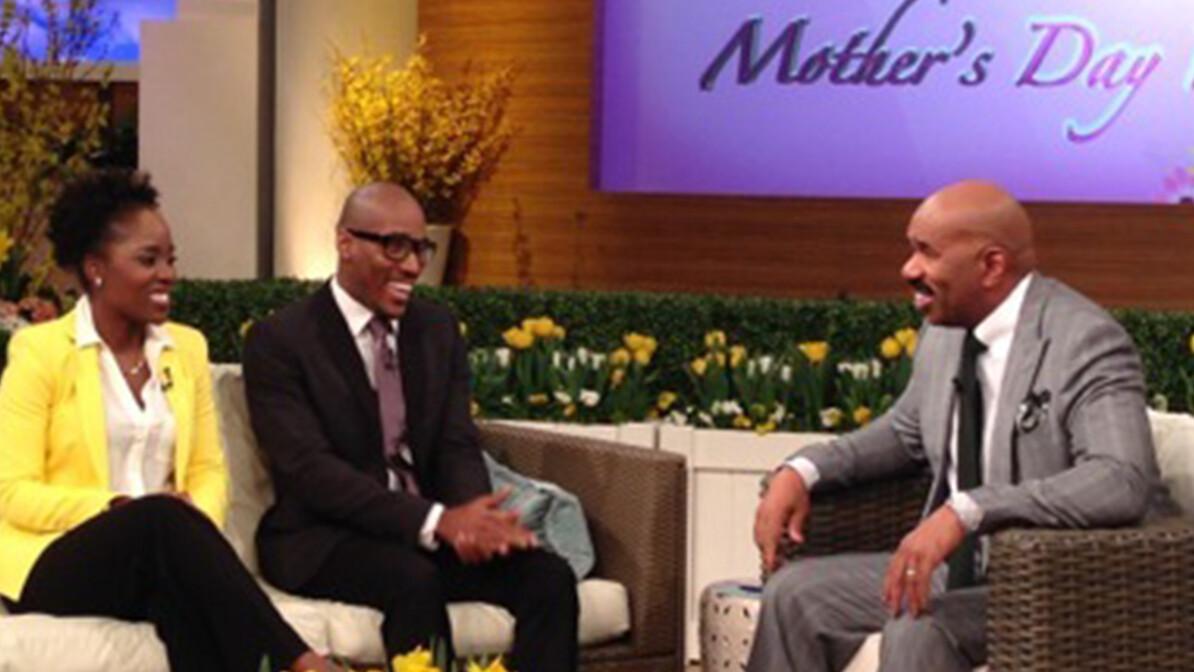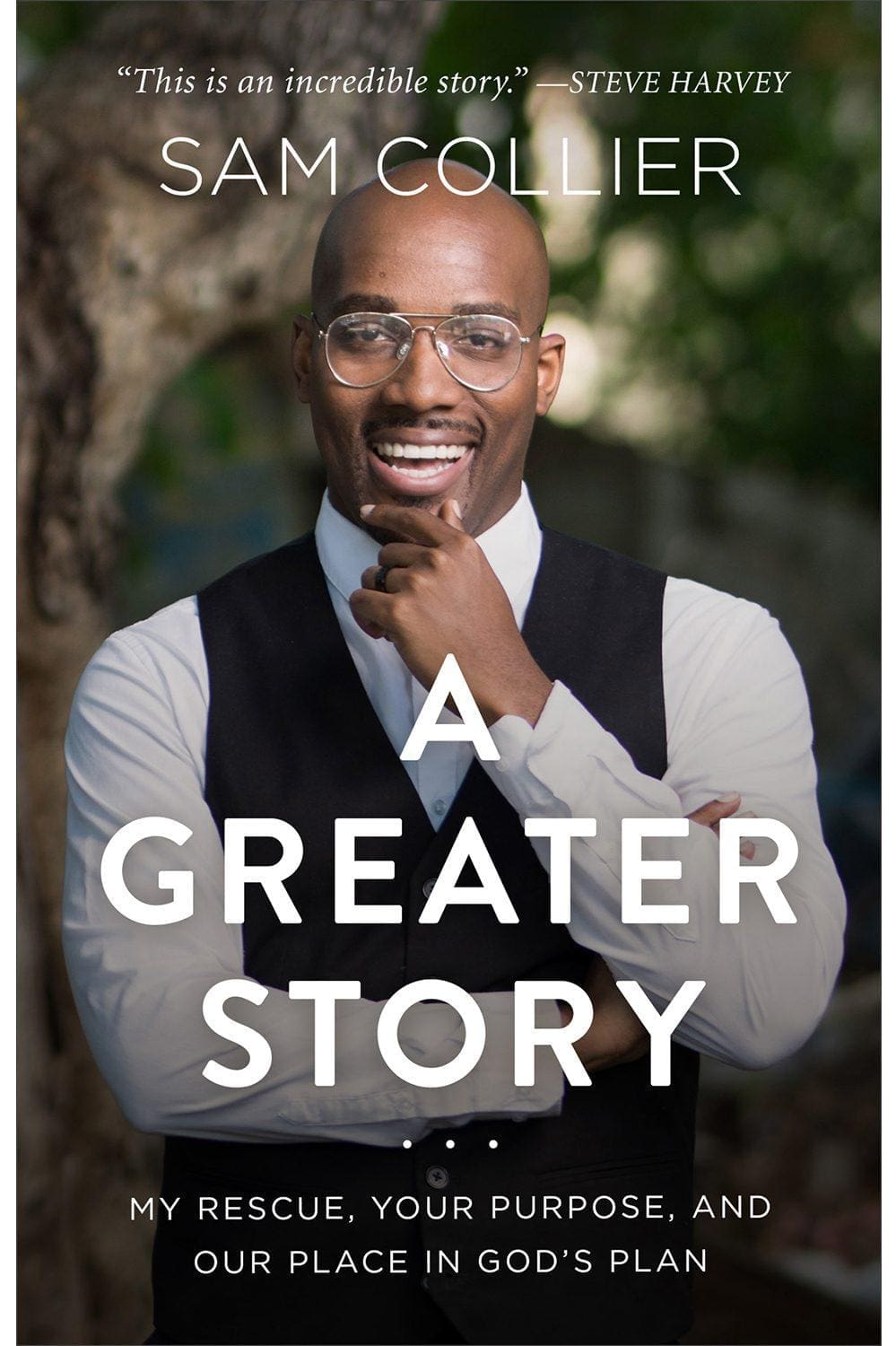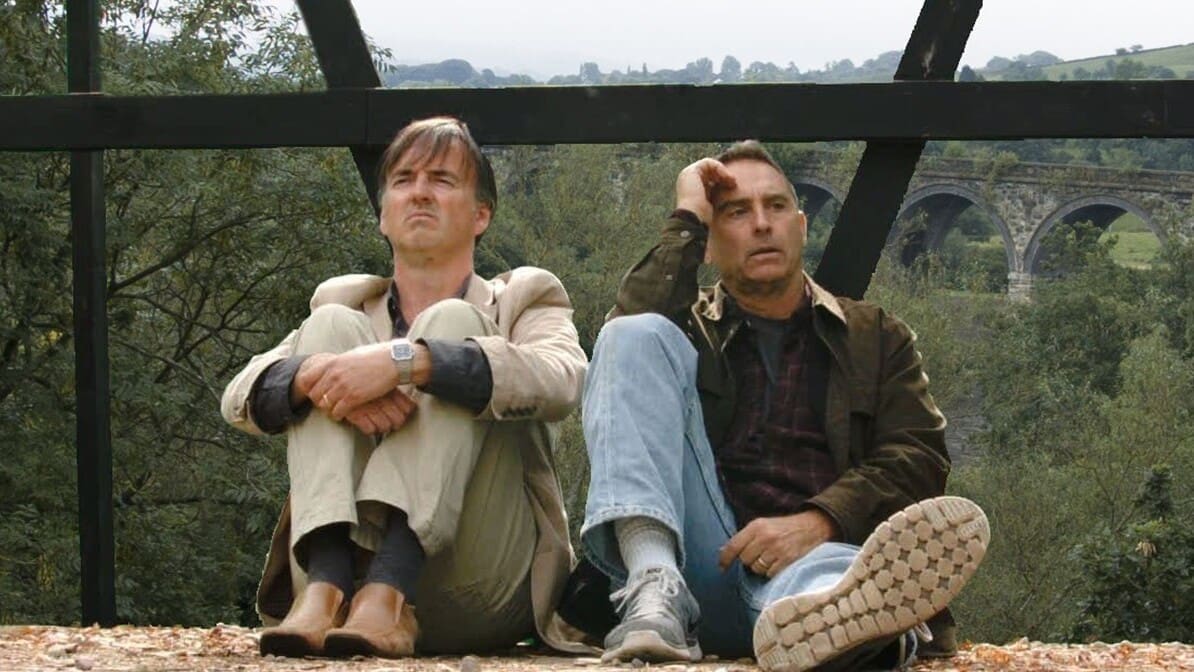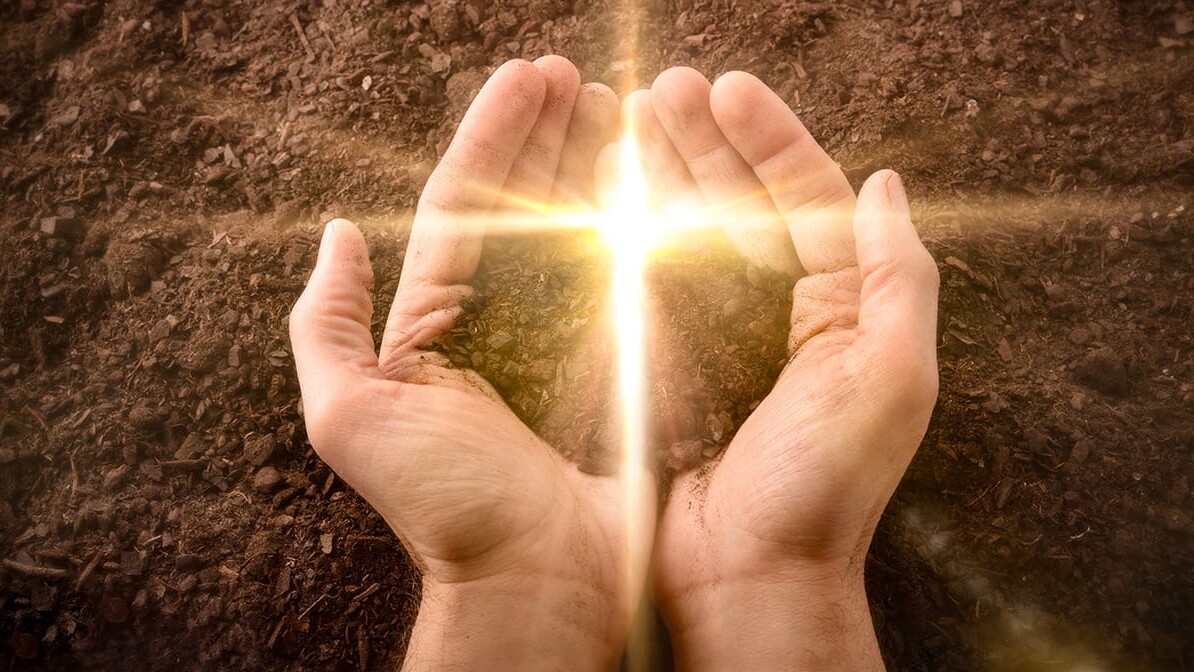- Home
- Entertainment
- Sam Collier: From the ‘Steve Harvey Show’ to Connecting His Story to God (Part 1)

Sam Collier: From the ‘Steve Harvey Show’ to Connecting His Story to God (Part 1)
 John Farrell: What inspired you to share your story in the form of a book, A Greater Story?
John Farrell: What inspired you to share your story in the form of a book, A Greater Story?
Sam Collier: I’m not gonna say I’m not all right, but that was not something that I ever set out to do. And so to get to the point in which I felt like a book was necessary there was a journey. Long story short, about six years ago, I met my biological family on the “Steve Harvey Show” after 25 years for the first time. That was just unbelievable.
At the time, I was also doing a lot of ministry at North Point Ministries under the leadership of Andy Stanley. One of the campus pastors, Jeff Henderson and I became very close. He asked me to come and tell the story of what happened on the “Steve Harvey Show” at the Gwinnett location within North Point Ministries. So I did.
It was my first time doing it. I’ll be honest, we showed the clip in the middle of the message where we are reuniting with our birth family – me and my twin sister for the first time – and there were tears all over the room. People were walking up to me and my adoptive parents, bringing their kids that they adopted and also bringing their stories around how God can take our message and turn it into a miracle and how they needed Him to do the same with them. From that, we started touring and telling the message at different churches all around America and corporate environments. And we had the same response. I said, “After that, I think we need to put this in a book.”
JF: How did that whole appearance on the “Steve Harvey Show” come to be? And what is it about your story that is different from other stories that would make the “Steve Harvey Show” have an interest in your particular story?
Sam: The story’s interesting. About a year after my adoptive father made the decision to encourage us to go and reunite with our family – it was his decision, not that we were against it before but we were kind of amoral if you will – he said the Lord told him that Steve Harvey was going to help us find our biological family.
I thought he was crazy. The “Steve Harvey Show” called us because my sister wrote in two weeks after my dad said that, but they called us a year later. When I answered the phone, Dorothy, the producer of the “Steve Harvey Show” told me that this was her first week on the job and that there were a hundred stories on her desk and our story was the top story. It’s just providence.
I don’t know that our story was any different from anyone else’s that goes through hard things, but I do think God desired for it to happen. I think we all have our plans and then God kind of has His. I think this was a part of the plan, but beyond that on the very natural level, I think they felt they could find someone and that the story was kind of miraculous in a sense and crazy. That people watching the show would be intrigued. Also that there’d be a moment of inspiration with our life starting out in poverty, being rescued, and overcoming the odds. I think they were very interested in that.
JF: How did the sense of abandonment you felt during your childhood help shape you to be the person you are today?
Sam: It was everything, but I think what truly shaped me in my childhood was my dad and my mom, obviously. My dad was from the country and I say “Dad” because he’s the one who adopted us and raised us. He’s from rural Georgia – Pike County. Chickens, cows and rutabagas.
If you know anything about the country, people from the country are pretty down to earth and they’re pretty real. And they tell it like it is, and they can be polite or they can be impolite, but they tell it like it is. They tell you the truth. And so my entire life, my father always told us the truth. He said to us, “It’s not about the cards you’ve been dealt, but it’s about how you play the hand.”
I think that one narrative mapped out and sat above our life all throughout our life and kind of dictated what we decided to become and how we decided to move throughout life. He never let us talk about the idea of abandonment. He never let us live out of abandonment, rather acceptance.
I always say that “where you decide to look will determine what you see. Where you decide to look, will determine what you see.” The Scripture that backs that up for me is in Colossians when it talks about setting your mind on things above and not on the things of this earth. Paul is encouraging us all through the church where the Colossians were. He’s encouraging us to not look at the lower things, but to set our minds on the things of the kingdom and of the gospel and of the positive.
I believe that there is a belief and a hidden key within that that if you can set your mind on things above, then you’ll start to live above whatever is trying to hold you down. So, that’s what we did. We focused on the acceptance rather than the abandonment and that was a part of my childhood.
JF: Is that the main message you hope readers take from your book?
Sam: I think it’s one of them. I think what sits above that is this idea that at the end of the day, no matter what is happening in your life, if you set your mind on things above and look to the Lord, look above, look up and connect your story to Him then He will write a greater story.
It is this idea of connecting your story to God’s story that will lead to a greater story. Right now, in the season that we’re in with COVID-19, civil unrest, and all types of calamity and a sense of instability, we need more than ever to connect our lives and our stories to God’s story, because if we can do that, we will overcome these obstacles. God will either move the mountain – I’ve seen him do it for so many people during this season – or He will give us the strength to climb it.
JF: Outside of the pandemic, why do you think this message is important in today’s world.
Sam: If we take it outside of the context of COVID-19, I think in life there are so many people, so many Christians that believe that there’s more for them. They believe it; however, they don’t know how to get it. Or there are things holding them back that prevent them from blasting off.
What I wanted to do was write a book that removed the barriers. For many of us, they’re mental barriers that keep us down. I wanted to write a book that removed the barriers so that people could connect their story to God and it could lead to purpose.
After helping people connect their story to God, we spend a lot of time in the book building and creating that unique purpose that God has for us all.
One of life’s greatest questions is, “Why am I here? What is my purpose? Is there a purpose for me? Where is significance for me?” In the book, we spend about two or three chapters answering that question and providing some real clarity. To answer the question shortly, I think this message and these messages are so important in our world today because there is more for people and they need to know how to get it. And there is purpose and they need to know how to access it.
JF: What encouragement do you have for those who feel that God has abandoned them?
Sam: I think the encouragement that I have for them is a story. The story of Jesus in the boat with the disciples and the storm breaks out. We know what Jesus is doing. Jesus is asleep. As He is sleeping, the disciples panic and they rush to wake Him up.
If I were to pause for a second there, I would say that that’s where many people are. Today, when we talk about this idea of abandonment, that’s what we get, right? Even if we’re a Christian, when a storm breaks out or when things don’t go the way we think they should go, or when we’re feeling down like the disciples were in the boat and panicking, we start freaking out. We ask, “God, where are you?” Not, “What are you doing?”
I think sometimes we forget many times like the disciples forgot that the Messiah was with them in the boat. No matter what breaks out, no matter what happens, He is sitting right there. And I think for us, for those that feel abandoned, we have to remember that God is always with us. But for some reason, when the storms of life overtake us, we forget that He’s there, even though He’s sitting there the whole time asleep. Right?
I think sleep in the story represents resting. God is resting with us every single day. We have to do what Jesus told the disciples to do after they woke him up. He said to them, “Oh, ye of little faith.” In other words, “Where’s your faith?” He said you’ve got to have faith because the Messiah is in the boat with you.
JF: How can we trust God when we perceive his absence or worse, his rejection?
Sam: I think that’s a choice. I think where you decide to look will determine what you see. So, the question is how are we looking at God. I’m married and one of the biggest lessons I’ve learned was that sometimes I would perceive my wife doing something for a reason that she wasn’t doing.
There would be moments where I’m like, “Oh, you moved my shoes because you don’t think I’m organized.” Really, she’s just trying to get them in the closet. She’s just trying to keep the room clean, but because we come in with all of these stories that we tell ourselves about what we’ve experienced from other people in the past we make up things that are just not true. It’s about perspective.
I think for us, when we perceive God as rejecting us or abandoning us, we are making a choice to believe something that actually isn’t real. We have to make the conscious choice to choose the right thing, to choose the right choice, even in moments where our emotions and our flesh are telling us to do something different.
…
Order a copy of A Greater Story: My Rescue, Your Purpose, and Our Place in God’s Plan by Sam Collier
Trending Now
Sign up today for your Inspiration Today Daily Newsletter
Supercharge your faith and ignite your spirit. Find hope in God’s word. Receive your Inspiration Today newsletter now!
John Farrell
John Farrell is the Digital Content Manager for inspiration.org. In addition to having written more than 1,000 articles, press releases, and other pieces of content for Inspiration Ministries, NASCAR, Lionel, and Speed Digital, he authored The Official NASCAR Trivia Book: With 1,001 Facts and Questions to Test Your Racing Knowledge in 2012. John is a graduate of Appalachian State University and lives in Concord, N.C., with his wife and two sons.
Related Articles
April 19, 2024
Navigating the Digital Storm: 5 Tips for Mentoring Kids’ Faith
In an age where screens dominate our daily lives, parents face a daunting challenge: How can we…
April 19, 2024
Unashamed: Take Me As I Am
Excerpt from “Chapter 5: Take Me As I Am” of Unashamed by Lecrae The final night of the…
April 18, 2024
Movie Review: Grace and Gravity
According to a report published by the Centers for Disease Control and Prevention (CDC) and posted…
April 16, 2024
‘It Is Well with My Soul’
“It Is Well With My Soul” is a hymn that may bring peace and comfort when considering the peace…
Next Steps To Strengthen Your Walk
Submit A Prayer Request
We are here for you. Simply click on the button below to reach us by form, email or phone. Together we will lift our hearts and voices with you in prayer.
Partner WIth Us
Sow a seed of faith today! Your generous gift will help us impact others for Christ through our global salvation outreach and other faith based initiatives.
Inspiration TV
Watch Christian content from your favorite pastors, christian movies, TV shows and more.






